Corporate Tax Measures
Extending Budget 2020 temporary tax measures to support businesses
To continue providing support to businesses to deal with short-term challenges arising from COVID-19, the following temporary tax measures introduced in Budget 2020 have been extended in Budget 2021 for another year, with the same parameters:
Enhanced carry-back relief scheme capped at S$100,000
Taxpayers may carry back current year unabsorbed capital allowances (CA) and trade losses, capped at S$100,000, for deduction against assessable income of up to three (as opposed to one) immediate preceding Year of Assessments (YAs), subject to conditions.
Option to accelerate CA claims
Taxpayers who incurred capital expenditure on plant and machinery have an option to claim accelerated CA over two years (i.e. 75% in YA 2021 and 25% in YA 2022), with no deferment of claims.
Option to accelerate renovation & refurbishment (R&R) deduction
Taxpayers who incurred qualifying R&R expenditure have an option to claim R&R deduction over one YA (instead of three YAs). The cap of S$300,000 for every relevant three-year period continues to apply.
Our view
Temporary measures are welcomed but can more be done?
Potential benefits likely to be limited due to the quantum cap set
While the extension for another YA may go some way to help ease the cash flow for some, any potential benefits are however likely to be limited due to the quantum cap set for the respective temporary tax measures.Extension is of little support or help for businesses that are loss-making
With the exception of the enhanced carry-back relief scheme (which may help certain loss-making companies claim back some refund for any prior years' tax paid), the extension of the other temporary tax measures is not likely to be of any support or help for businesses that are loss-making due to the COVID-19 situation.Businesses should carry out a cost-benefit analysis
In considering whether to opt for the respective temporary measures, businesses should carry out a cost-benefit analysis, taking into account partial tax exemption, foreign tax credit, group relief considerations etc., where applicable, before opting for these measures.
100% Investment Allowance (IA) on approved automation projects allowed until 31 March 2023
The Automation Support Package (ASP) was introduced to support businesses to automate and scale up.
The scheme is administered by ESG.
The ASP will be allowed to lapse after 31 March 2021. However, the 100% IA on approved automation projects will still be allowed until 31 March 2023.
Our view
There’s still time to get support to automate
The main implication of the lapse of the ASP scheme is that approved projects will no longer enjoy both the cash grant support as well as the IA scheme on the same approved automation project.
Notwithstanding the lapse of ASP, there are other schemes such as the Enterprise Development Grant (EDG) that provide cash grants for automation projects.
Companies should continue to take advantage of the 100% IA support on approved automation projects until 31 March 2023.
Companies would have to assess whether the IA or EDG would be more beneficial – larger projects may benefit more from the IA scheme as the IA scheme will cover up to S$10 million of capital expenditure, whereas the EDG is usually capped at a much smaller amount.
Companies which have plans to embark on automation projects should tap on the available schemes as soon as possible for their automation transformation journey.
Extending and enhancing the Investment Allowance (Energy Efficiency) (IA-EE) scheme
Under the current IA-EE scheme, investment allowance is granted on capital expenditure incurred for energy-efficient or green data centre projects which result in more efficient energy utilisation, subject to meeting certain conditions.
Additional conditions apply to data centre projects as follows:
- Compliance with the Singapore Standard for Green Data Centres
- Have a minimum capacity of 400m2 (floor space)
This scheme, which is scheduled to lapse after 31 March 2021, will now be extended to 31 December 2026 and will be renamed as “Investment Allowance for Emissions Reduction”. However, the following changes are proposed for projects approved by the Economic Development Board (EDB) from 1 April 2021:
- Expansion of scope of qualifying projects to include projects involving a reduction of greenhouse gas emissions
- Streamlined and updated eligibility conditions will apply to all projects (i.e. no distinction between data centres and non-data centres projects)
- EDB will provide further details by end June 2021.
Our view
It’s time to go green
The extension and enhancement of this scheme is aligned with the Government’s continuous efforts to encourage businesses to focus on energy efficiency initiatives.
The changes are welcome and timely as a wider range of projects can now find support under this scheme as long as they involve reduction of greenhouse emissions and meet the relevant conditions of the scheme. Companies that are planning to embark on green or sustainability initiatives to increase energy efficiency or reduce energy consumption should be able to benefit from this enhanced scheme.
Enhancements to Double Tax Deduction for Internationalisation (DTDi) scheme
The scope of DTDi is enhanced to include:
- Specified expenses incurred to participate in approved virtual trade fairs such as:
- package fees charged by organisers
- third party costs for digital collaterals and promotion materials
- logistics costs to send materials/samples overseas to potential clients
- Logistics costs to transport materials/samples used during overseas investment study trips
- Additional activities that do not require prior approval from ESG or Singapore Tourism Board for tax deduction up to a cap of S$150,000
The above enhancements will take effect on or after 17 February 2021. ESG will provide further details by 28 February 2021.
Our view
International growth amidst a new business environment
The enhancements to include costs incurred to participate in approved virtual fairs is necessary in view of travel restrictions due to the COVID-19 pandemic. It is also in line with a structural shift from "physical" to "virtual" in the new reality.
The expanded list of qualifying activities that do not require prior approval from the relevant agencies will help alleviate administrative burden on businesses. However, we hope there is simplicity in the approval process of virtual trade fairs.
Businesses seeking to internationalise in the midst of COVID-19 should tap on the enhance DTDi scheme to defray business cost.
The enhancement to the DTDi scheme, however, benefits companies in a tax-paying position in terms of cash flows while leaving tax loss companies with an equal compelling need to venture overseas with no additional cash flow benefit.
Extension and refinement of tax deduction for costs attributable to retail bonds
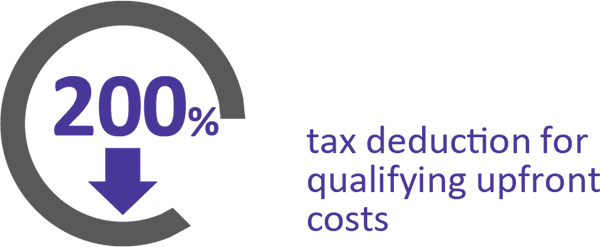
Double tax deduction (DTD) on qualifying upfront costs attributable to retail bonds issued under MAS’ Seasoning Framework and Exempt Bond Issuer Framework has been extended to 31 December 2026.
From 19 May 2021, the DTD on such costs will apply only to rated retail bonds issued during the period from 19 May 2021 to 31 December 2026.
All other conditions of the DTD scheme remain the same.
MAS will provide further details of the changes by 31 May 2021.
Our view
Cushioning the cost of bond issuance
Against the backdrop of the disruption caused by COVID-19, the extension is beneficial for businesses to continue raising funds via retail bonds to tide over this difficult time and partially alleviate business costs.
Businesses should take advantage of the additional deduction to cushion the cost of the bond issuance. Additionally, the refinement of the DTD scheme to cover rated retail bonds (instead of all retail bonds) seeks to improve transparency in the bond market allowing investors to make independent assessments of the creditworthiness of the bond issuers.
Extension and rationalisation of WHT exemptions for the financial sector
1. Interest and other payments falling within section 12(6) of the ITA made pursuant to interbank / interbranch transactions by banks in Singapore for the purpose of their trade or business are exempt from tax under section 92(2) remission. The existing WHT remission for interbank / interbranch transactions will be legislated as a WHT exemption with effect from 1 April 2021, along with a review date of 31 December 2031.
2. Interest related payments made by banks, finance companies and certain approved entities i.e. Specified Entities to non-resident person (excluding any permanent establishment (PE) in Singapore) for the purpose of Specified Entities’ trade or business are exempt from tax. The WHT exemption which was previously scheduled to lapse after 31 March 2021 will now be extended till 31 December 2026.
3. Specified Entities are not required to withhold tax on all section 12(6) payments made to PE in Singapore. The WHT exemption which was scheduled to lapse after 31 March 2021 will now be extended till 31 December 2026. The PE in Singapore are required to declare the section 12(6) payments that they receive in their annual income tax returns and are assessed on such payments (unless the payments are specifically exempt from tax).
All other conditions of the WHT exemption remain the same. MAS will release further details of all the changes by 31 May 2021.
Our view
Underlining Singapore’s commitment to a more streamlined WHT regime
The extension and rationalisation of WHT exemption signifies that Singapore is committed to streamlining the WHT regime for the financial sector. This provides financial institutions in Singapore access to a wide range of funding sources and strengthen Singapore as a global financial centre.
There was no sunset clause previously indicated for the interbank / interbranch WHT remission. With the proposed legislation, there is a review date of 31 December 2031 which banks will need to take note going forward.
The continued WHT exemption for interest related payments can help to deepen market liquidity for financial products including green bonds and help to anchor Singapore as a green finance hub.
Extension of WHT exemption on payments made for structured products
WHT exemption is allowed on payments made to a non-individual, non-resident person (excluding any PE in Singapore) from structured products offered by a financial institution in Singapore. The WHT exemption was previously scheduled to lapse after 31 March 2021.
To support Singapore’s value proposition and competitiveness of the financial sector, WHT exemption will be extended for another five years and will cover payments made under a contract that takes effect during the period from 1 January 2007 to 31 December 2026 (both dates inclusive).
All other conditions of the WHT exemption remain the same.
MAS will release further details of the changes by 31 May 2021.
Our view
Playing to win as a regional and global financial centre
The financial sector operates in a very competitive landscape. Any WHT levied on gross payments where the financial institution (i.e. payor) has to bear the WHT will reduce the income margin earned by the financial institutions based in Singapore. The continued liberalisation of WHT exemptions on payments made to the non-resident person from structured products will allow Singapore to be competitive as a regional and global financial centre.
Extension of WHT exemption on payments for over-the-counter (OTC) financial derivatives
WHT exemption has been extended by five years till 31 December 2026 to support Singapore’s value proposition and competitiveness of our financial sector.
WHT exemption is granted on payments made to any non-resident person (excluding any PE in Singapore) from OTC financial derivatives made by a financial institution in Singapore. The WHT exemption was previously scheduled to lapse after 31 March 2021.
The exemption will cover all payments on OTC financial derivatives made by a financial institution in Singapore to any non-resident person (excluding any PE in Singapore) where such payments are made:
- During the period from 20 May 2007 to 31 December 2026 (both dates inclusive) under a contract that took effect before 15 February 2007; or
- Under a contract that takes effect during the period from 15 February 2007 to 31 December 2026 (both dates inclusive).
All other conditions of the WHT exemption remain the same.
MAS will release further details of the changes by 31 May 2021.
Our view
Strengthening Singapore’s reputation as a trading centre
The COVID-19 pandemic has impacted global supply chains. Derivatives are risk management products which are important and attractive in times of volatility in the financial and commodity markets. The extension of WHT exemption will help to promote the derivative markets and strengthen Singapore as a regional and global trading centre.
Lapse of Insurance Business Development — Specialised Insurance (IBD-SI) scheme
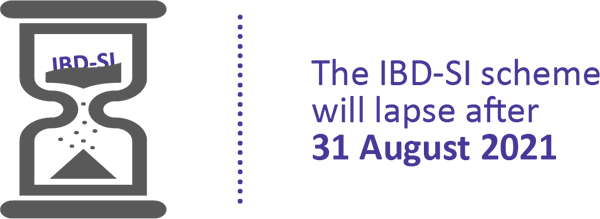
Insurers / reinsurers engaged in specialised insurance / reinsurance may apply for other incentives under the IBD umbrella scheme.
Our view
Minimal impact on companies insuring specialised risks
Given the minimal disparity in the concessionary rate under the IBD-SI scheme (8% for new award) and the IBD-Standard Tier scheme (10%), it is not surprising that the take-up rate for the IBD-SI scheme amongst qualifying insurance market players has traditionally not been strong.
The lapsing of the IBD-SI scheme should not have a material adverse tax impact on companies insuring specialised risks, as such qualifying income should be subsumed under the IBD-Standard Tier scheme.
Accelerated depreciation allowances for highly efficient pollution control equipment (ADA-PCE) scheme to be withdrawn
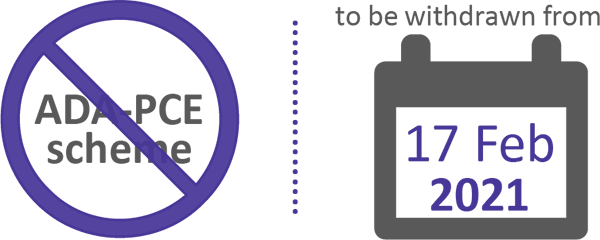
The ADA-PCE scheme was introduced in Budget 1996 to encourage businesses to employ clean technologies to improve air quality in Singapore.
Under the scheme, taxpayers who incurred capital expenditure to install qualifying highly efficient PCE may choose to accelerate the CA claim on the acquisition cost over one year.
Our view
Time to shift our focus to other green initiatives
Regulatory measures for improving air quality to continue
Notwithstanding the lapse of the ADA-PCE scheme, regulatory measures will continue to be in place to ensure that the pollution is managed and air quality in Singapore remains of a high quality.
To ensure their effectiveness, the regulatoy measures will be regularly reviewed by Ministry of Sustainability and the Environment and the National Environment Agency.
Green initiatives continue to be a focus area
Whilst the Government has withdrawn this scheme, go-green initiatives continue to be a focus area for the nation, as demonstrated by the extension and enhancement of the IA-EE scheme in this Budget.
GST to be collected on imported low-value goods and non-digital services
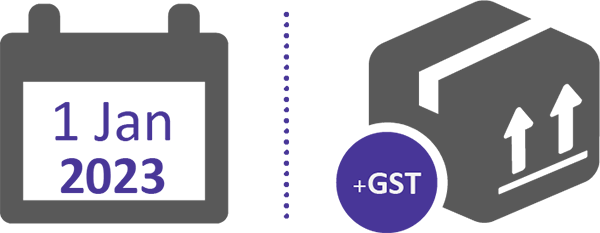
With effect from 1 January 2023, GST will be collected on the import of low-value goods (S$400 and below) by air and post, and on the import of non-digital services.
Overseas suppliers are to register and charge GST on sales of low-value goods and non-digital services to non GST-registered Singapore buyers.
GST-registered buyers will self-account the GST on such purchases under the existing reverse charge mechanism.
Our view
GST on cross-border goods and services
With these changes, GST is extended to all cross-border goods and services.
Examples of non-digital services are live interaction with overseas suppliers of educational learning and counselling.
As overseas suppliers are to register and charge GST, retail buyers do not have to self-register for GST. The GST will be an additional cost for retail buyers. There will no longer be an advantage to buy from overseas sellers. This achieves a level playing field for Singapore sellers.
GST-registered buyers will account for GST under reverse charge, but only if they are unable to claim the GST in full. Businesses that can claim in full will not be affected.
Clarity is required in determining the GST registration threshold for overseas sellers and online marketplaces.
Change in basis of zero-rating media sales
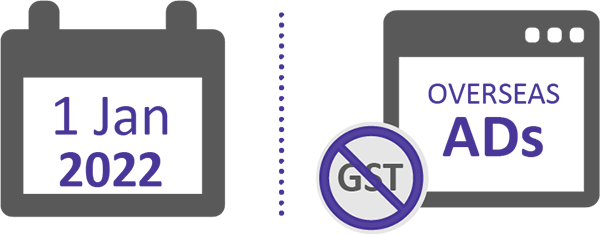
Currently, media sales for advertising are zero-rated based on the country of circulation. If the advertisement is substantially circulated outside Singapore, it is zero-rated.
From 1 January 2022, zero-rating will be based on the country of the contracting party and the direct beneficiary.
To the extent that the contracting party belongs outside Singapore and the direct beneficiary also belongs outside Singapore or is GST-registered in Singapore, zero-rating applies.
Our view
Convergence in zero-rating rule
The revised basis of relying on the country of the contracting party and the direct beneficiary brings into closer alignment the zero-rating rule for advertising with those of other exported services.
Developments in digital technologies have changed the way media sales are supplied, making it difficult to apply the circulation based zero-rating rule. The revised basis should therefore make for easier determination of whether a media sale can be zero-rated.
Clarity in applying the revised basis from IRAS, in particular in identifying the direct beneficiary, would be important for implementation.
